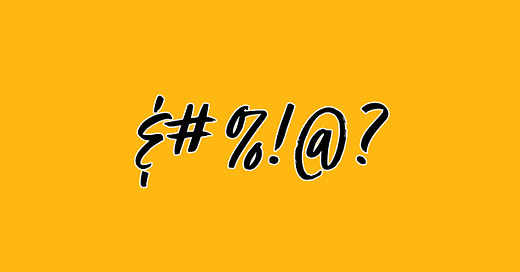Banneord: The Relative Politeness of Norwegian Swearing
Even in well-mannered company, Norwegians can drop cuss words without much worry.
Norwegian swearing is a strange beast. Compared to English profanities, it’s tame and mostly based on archaic Lutheran words. In place of an American f-bomb, for example, Norwegians use a bygone version of “the Devil,”1 and that’s about as severe as it gets, at least in the urban areas.
Weirdly, the further north you go, the more colorful the language turns. In one rural area, the courts decided it was culturally OK for a driver to call a traffic cop a very naughty word, which I choose not to repeat here. (It relates to a part of a horse, and… you know, you figure it out.)
In that sense, some real zingers do exist, but in cities, those words tend to be reserved for the bourgeoisie.
And, in case you should find yourself in Norway and want to show your edgy side, here are the banneord – curse words – that will give you your deserved and slightly polite street cred.
Faen: The Milder F-Bomb
The most common Norwegian cuss word literally means “the Devil.” If you direct it toward someone, you say, “Faen ta deg,” i.e., “may the Devil take you,” which presumably stems from “Faen ta deg til helvete” – “may the Devil take you to hell.”
Switching “you” with “me,” “Faen ta meg” translates to “may the Devil take me,” but is used in a wholly different context: “Friggin’.” So, “de skulle faen ta meg ha vunnet” cleanly becomes “they should have friggin’ won.” The Devil works in mysterious ways.
“Fy faen” means “damn it,” though it is hard to translate directly. ”[spit sound], Devil,” is as close as I can get.
A toned-down version of “faen” is “søren,” which, oddly, is also a name. I was halfway wondering if Søren, at some point, was used as the Devil’s name, kind of like Lucifer, but I could not find any proof of that.
How to pronounce “Faen” (will open in browser)
Other Common Profanities
Jævel: Simply a lower-cased “devil,” used more in the vein of “bastard.” It has also taken on a positive form: “Jævlig bra,” which means “really good.”
Svenskejævel: Just to cement the stereotypical Norway/Sweden rivalry, “Svenskejævel” translates to “Swedish devil” or, more correctly, “Swedish bastard.” It’s used more than one would hope.
Forbanna: Continuing down the “jævel” path, “forbanna” means “damned,” and is often used alongside “jævel” – “forbanna jævel.” “Damned devil.”
Helvete: This simply means “hell.” Not unlike its English brethren, “go to hell,” “dra til helvete” is commonly used.
Some Legacy Classics
Fytterakkeren: I have not been able to find the etymology for this one, but it translates to something like “good grief.” Breaking apart the word, “fytte” would likely be a spit sound, while “rakkeren” translates to “The Nightman.”
A “nightman,” as it turns out, is someone who emptied latrines in the 1500s.
Pokker means “damn” or, if directly translated, “smallpox.” It is used in the context of “pokker ta deg,” i.e., “may the smallpox take you,” so not a million miles away from “damn you.”
Snørrunge: Finally, not a profanity, but a putdown that in my mind is a glorious slap-down: “snot-kid.” I know there are similar English expressions, but man, snot-kid. What a mic drop.
Wikipedia: Søren. Jan 17, 2025.
I am, of course, aware that “devil” is used in English, too, but then, how often do you hear “What the devil are you talking about?” these days?





What I'm getting from this is that the average Norwegian would last exactly ten minutes in the UK, the Arab world, or Italy before being scandalised to death; the latter two have turned biologically impossible, sacrilegious profanity into colloquialisms.